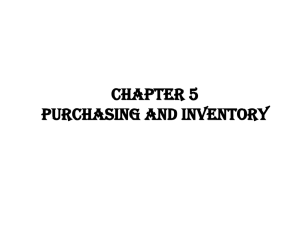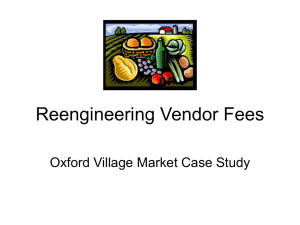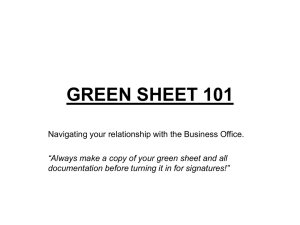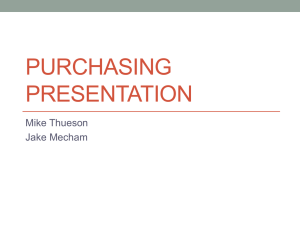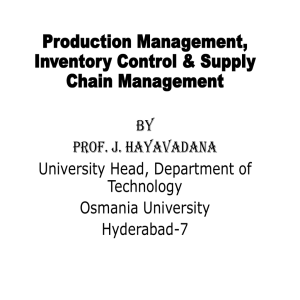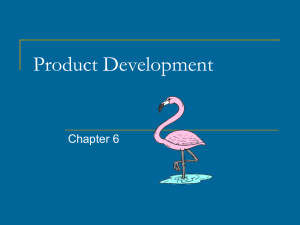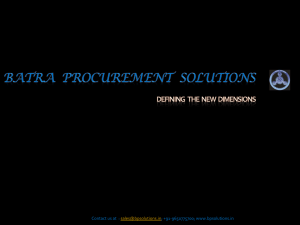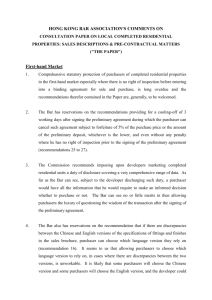Chapter 7_March2013
advertisement
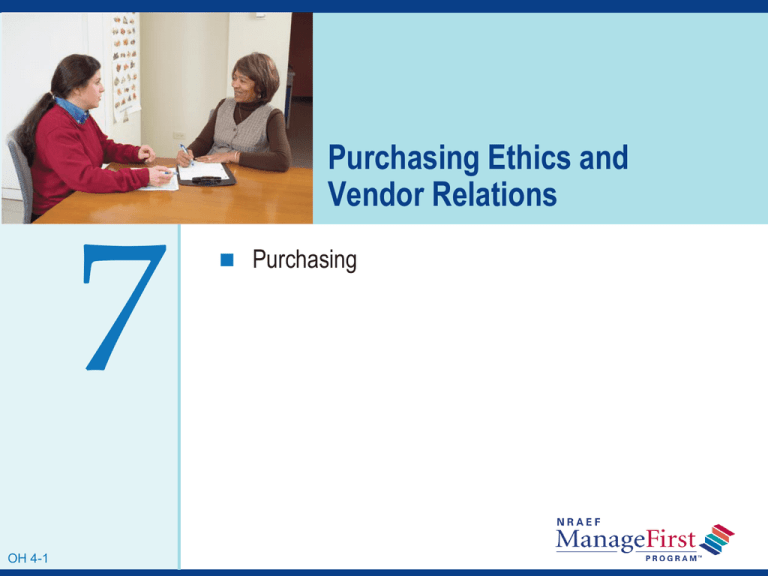
Purchasing Ethics and Vendor Relations 7 OH 4-1 4-1 Purchasing Chapter Learning Objectives Explain the importance of ethical concerns in purchase decision making. Explain how codes of ethics and purchasing policies provide guidelines to purchasers as they interact with vendors. Describe the importance of professional vendor relationships. Summarize the basics of vendor’s handbooks. OH 4-2 Let’s look at the case study Page 173 of the text OH 4-3 Purchasing Ethics What is legal activity? Legal activity is permitted by law and a person cannot be prosecuted for doing it. Just because something is legal, is it acceptable and professional? Where do ethics and morals come in? Ethics = complying with standards for conduct Moral = based on principles about right and wrong OH 4-4 Purchasing Ethics continued Statements of Business Conduct Company policy that defines ethically and morally what is acceptable and professional. Purchasing Code of Ethics Policy that sets guidelines that should be followed as purchasers implement purchasing procedures and make purchasing decisions. OH 4-5 Ethical Behavior Ethical behavior refers to behavior that society in general or the culture of the establishment or the industry considers “the right thing to do.” Is it legally permitted? Does it follow company policy or code of ethics? Does it harm anyone? Is it fair and truthful? Would I care if it happened to me? Would I tell others about it? What if every person did the same? OH 4-6 Ethical Behavior Let’s read the example on page 175 OH 4-7 Codes of Purchasing Ethics The best operations have a highly developed sense of professional ethics to protect and enhance their reputation. Page 178 in text Let’s read each one OH 4-8 Codes of Ethics continued A code of ethics, even if written, will not be effective unless there is ongoing enforcement and consequences for failure to follow. Disciplinary actions for failure to comply with the code should be planned, written and communicated to purchasers. Purchasing policies help provide consistency because issues will always be addressed and problems resolved in the same way; that is according to the applicable policy. OH 4-9 Common Ethical Policies Accepting Gifts In most cases, ethical purchasers avoid accepting gifts from current or potential vendors. Some operations establish maximum values for gifts – What do you think is an acceptable amount/value? Examples on page 183 (Darden) & 184 (Wendy’s) Free Samples Should be accepted only if the operation has a sincere interest in potentially purchasing the product OH 4-10 Common Ethical Policies continued Free Samples Should be accepted only if the operation has a sincere interest in potentially purchasing the product Competitive Bidding Policy Ensure that the best price is received for products meeting quality requirements from approved vendors Implement a process that reduces the possibilty of favoritism. OH 4-11 Common Ethical Policies continued Best Price First Purchasers use a best price policy when they indicate that the first bid will be the only price that the vendor can offer. Conflict of Interest When purchaser or any relatives or friends own or have an interest in a business that sells products to the operation. OH 4-12 Common Ethical Policies continued Vendor Errors Purchasers should all vendor documentation carefully and ask for verification prior to awarding the contract if something appears unusual. Local Buying Focus of business, community support, best price; all must be considered in buying local OH 4-13 Common Ethical Policies continued Back-Door Selling Vendor’s representative attempts to contact or influence a production employee with approval of the purchaser. Trial Orders and Samples Small quantities are generally allowed with the intent that the products will be purchased upon evaluation OH 4-14 Common Ethical Policies continued Kickbacks Money or other gifts received by an employee in return for purchasing from a specific vendor. Considered the most serious ethical violations and they are also illegal. Reciprocity A purchaser agrees to buy something from a vendor in return for some kind of business from the vendor. OH 4-15 Common Ethical Policies continued Personal Purchases Also known as steward sales These are employee purchases of goods to take advantage of the company’s purchasing power. When offered, steward sales must be closely monitored to ensure payment. OH 4-16 Vendor Relations Concept relates to the ways in which purchasers interact with their vendors. OH 4-17 Vendor Relations continued General factors that often influence the relationship between purchaser and seller. Relative size or business volume of both organizations Reliance on the vendor Compatibility Extend that resources are committed OH 4-18 Importance of Professional Relationships Long term relationships allow for collaborative efforts that emphasize trust, flexibility, and innovation. Any problems that arise between purchaser and the vendor should be identified, discussed, and resolved quickly, and communication between the purchaser and the vendor should be ongoing. OH 4-19 Importance of Professional Relationships cont The purchaser’s experience with vendors will be based on several factors: Consistency of product quality and availability On-time and accurate deliveries Effectiveness of communication Value pricing Interest in addressing the purchaser’s concerns Level of service provided Quality of information supplied Problem-free payment processing and reasonable payment terms OH 4-20 Vendor Handbooks OH 4-21 A vendor’s handbook is developed by the establishment to inform vendors about the organization’s purchasing policies and procedures. Distributed and discussed with approved vendors Page 188 Key Terms: Code of purchasing ethics Guidelines that should be followed as purchasers implement purchasing procedures and make purchasing decisions. Ethical Behavior that society in general or the culture of the establishment or the industry considers “the right thing to do.” Kickbacks Money or other gifts that are received by an employee in return for purchasing from a specific vendor. Legal Permitted by law. Moral A standard that is based on principles about what is right and wrong. Reciprocity A situation that occurs when a purchaser agrees to buy something from a vendor in return for some kind of business from the vendor. OH 4-22 Key Terms: continued Statement of business conduct A broad code of behavior that addresses many aspects of the business and its employees who have a wide variety of functional responsibilities within it. Steward sales A situation that occurs when some companies allow their employees to buy products purchased by the establishment for their personal use. Supply chain A coordinated system of businesses, people, activities, information, and resources that move products from the manufacturer, processor, or grower to an operation. Vendor relations The ways in which purchasers interact with their vendors. Vendor’s handbook A handbook developed by an establishment to inform vendors about the organization’s purchasing policies and procedures. OH 4-23
